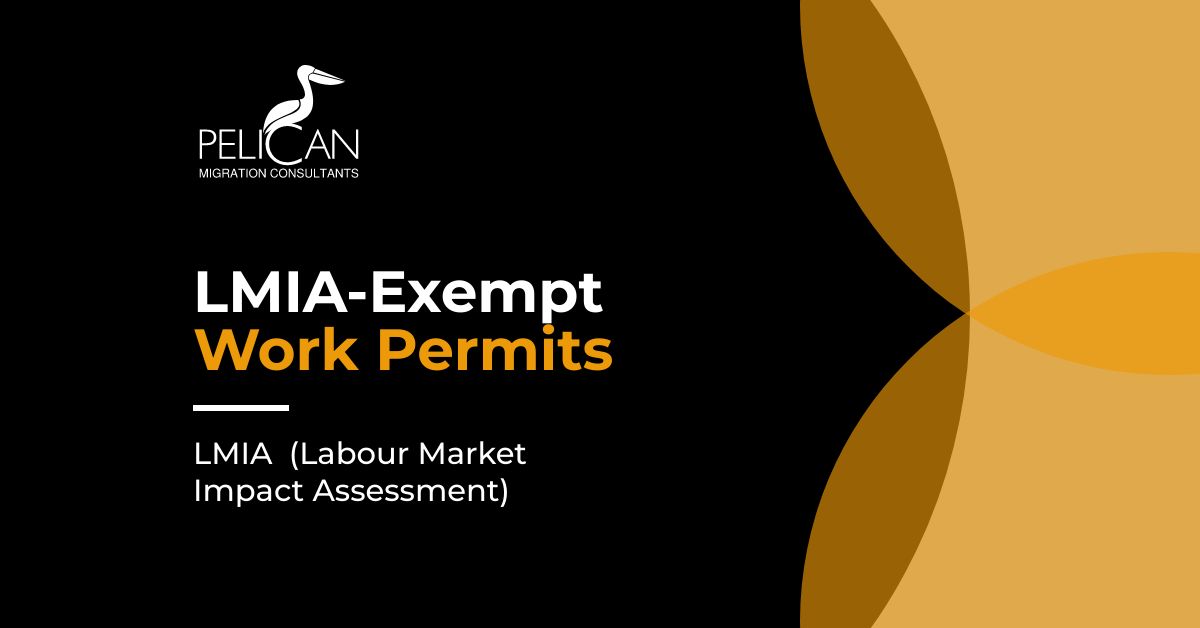
The company must obtain an LMIA (Labour Market Impact Assessment) from ESDC (Employment and Social Development Canada), which allows them to hire foreign skilled workers for jobs that cannot be filled by Canadian citizens or permanent residents. But, if you fit under one of these categories, you may be allowed to hire a temporary foreign worker without doing a Labour Market Impact Assessment (LMIA) or even bring somebody to move to Canada without the need for a work permit. Read on to know more.
The International Mobility Program (IMP)
The International Mobility Program (IMP) is a work permit programme in Canada that promotes the country's social, economic, as well as cultural interests. Such work permits are exempt from the LMIA since the government has concluded that the foreign worker's work will provide a "substantial advantage" to Canada, and also because the exemption is based on a reciprocal arrangement between Canada as well as the foreign worker's country.
You will not have to go through the LMIA processing if your hiring circumstance fits in one of IRCC's LMIA exemption categories or a work permit exemption. Before hiring foreign workers under the IMP, you must pay an employer adherence fee as well as submit an offer letter via the IRCC's Employer Portal. Employers in Quebec wouldn't need a Quebec Acceptance Certificate (CAQ) to hire through the IMP.
Here are various LMIA-exempt work permits in Canada:
-
Intra Company Transfer (ICT)
Through an Intra Company Transfer, multinational corporations may be able to send essential personnel to operate at their Canadian site. This option is offered to companies with a parent, subsidiary, affiliate, or associated location in Canada. It is not sufficient to simply have a physical address.
Furthermore, in Canada, the occupation may be restricted to executives and senior managers, management staff, or employees who can demonstrate a specialized understanding of the company's products, services, operations, and procedures.
-
CUSMA
Under the Canada-United States-Mexico Agreement (CUSMA), citizens of the United States, as well as Mexico, can obtain Canadian work permits. CUSMA, formerly recognized as NAFTA, allows Canada, the United States, and Mexico to exchange talent without any need for LMIAs. Under CUSMA, four types of temporary work are supported:
- CUSMA Professionals – Workers who already have pre-arranged work opportunities and are eligible to work in one of nearly 60 targeted professions.
- Intra-Company Transfers – Managers, executives, or employees with specialized knowledge who transfer to Canada to take a job for a subsidiary, branch, or affiliate of their U.S. or Mexican company.
- CUSMA Traders – Individuals coming to Canada to conduct substantial trade in products or services between Canada and the United States or Mexico.
- CUSMA Investors – Investors who've already made a significant investment in a new or prevailing Canadian business and are showing up to Canada to establish and direct it.
-
CETA
The Comprehensive Economic and Trade Agreement (CETA) is Canada's free trade agreement with both the European Union and its member countries. CETA may benefit four different groups of people:
- Business visitors: Short-term business visitors as well as business visitors heading to Canada for investment purposes are both included in this category.
- Intra-company transferees: Senior management and specialists may move to a Canadian branch without obtaining an LMIA.
- Investors: Europeans who have made a significant investment in the new or prevailing Canadian business and are showing up to Canada to establish and direct it.
- Contractual service providers and independent professionals: This CETA category applies to specific service providers and self-employed individuals.
-
Television and film
The TV and Film Production Work Permit Category allows TV and film production companies to bring in key personnel to Canada. Foreign and Canadian film producers can use this work permit categorization to bring talent to Canadian places if they can prove that the tasks done by the foreign national are critical to the production.
-
Business Visitors
Business visitors do not need a work permit to move to Canada to conduct business or trade activity. This provision may appeal to individuals coming to Canada to attend conferences, purchase Canadian goods or services for a foreigner, train employees or be skilled for work to be performed outside of Canada, among other things. They may also offer after-sales or lease services. These are among the general requirements for qualifying as a business visitor:
- The intended stay in Canada seems to be for less than six months.
- Foreign national does not intend to enter the Canadian labor market, and their primary source of income or revenue is outside of Canada.
- The foreign national fulfills Canada's basic entrance requirements, which include having a valid passport, having enough money to cover the duration of the stay and returning home, and not being criminally or medically inadmissible. To immigrate, business visitors may require a Temporary Resident Visa (TRV) or an Electronic Travel Authorization (eTA).
After-sales or lease services
A worker will not need a Canadian work permit if they really are coming to Canada to do repair work as well as servicing, supervise installation services, or set up and test commercial and industrial equipment (which would include computer software). Individuals who perform this sort of work may be classified as business visitors. Hands-on installation, as practiced by construction or building transactions such as electricians or pipe fitters, is not included in setting up.
After-sales or lease services also apply to individuals who come to repair or service specialized equipment bought or leased outside of Canada and offered the service as part of the initial or extended sales agreement, tenancy agreement or rental agreement, warranty, and perhaps even service contract.
It includes cases where the sales or lease agreement and perhaps even purchase order is for a software update to run previously sold or leased equipment. A service person visiting Canada to install, set up, or train on an upgraded operating system may also be called a business visitor. This provision does not apply to hands-on building and construction work.
Would You Like to Migrate to Canada in 2022?
Because of the continuously changing immigration standards and regulations, it is best to contact Canada Immigration Consultants who can assist and guide you throughout the process. At Pelican Migration Consultants, our primary goal is to offer you all the necessary information you require to make the right decisions. We are a licensed consultant to help you plan and manage your immigration to Canada and eventually lead a successful life in the country of your dreams. What’s more, we don’t make you spend a penny more or wait a day longer until and unless it is out of our control.
We provide professional one-to-one assistance ensuring you give your best in front of the Canada immigration Department. We help the clients by analyzing the client's chances of being granted a visa, then preparing clients and giving feedback for VISA interviews, and developing a customized immigration strategic plan for each client separately. Best Wishes!


